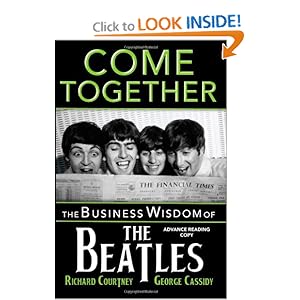Unlike Naomi Klein, I am actually very good at not only judging a book by its cover but I can completely read a book from beginning to end just by looking at its cover.
And you can too!

I was in the bookstore today. Naturally I went over to the business section to see if they were carrying any copies of my books. If they had any of my books, my plan was to then go to the manager, Bono, and tell him I’d be happy to autograph them. Bono would then look at me in a sort of confused way as if to say, “You?” and then say something like, “we just ran out of magic markers.” And then I would say something like, “oh, they don’t need to be magical at all. I’m not going to cast a spell on the books.”
Then we’d both laugh a little and that would be that. And as they say in the ancient texts of Hinduism, because of that simple interaction, that book store manager and I were probably mother and daughter in a thousand trillion lifetimes together.
But unfortunately they were not carrying my book.
So I took the above photo of the books on display. And while I was standing there, I read them all. Light that was reflected off of the surface of the moon when I started reading all the books on the table had still not arrived on the planet Earth by the time I had finished reading them. Thats how fast I read these books. And how fast you can read them also. I’ll tell you quickly what they were about.
First off, “Faster, Cheaper, Better” is the most obvious one. Its a 280 page metaphor about very embarassing sexual moments in my life at the ages of 5, 16, 17, 21, 33, and 42. They compare those moments to how the Internet is making all commerce faster, cheaper, and, with age, better. Its a very embarassing book about me though.
Next, “Super Boom” is by a friend of mine. So, by definition then, its excellent. It has a bunch of indisputable statistics about how the market and capitalism are going to keep flourishing until the Dow hits 38,000. No…Wait…Wait for it. Ok…I read a tiny bit more. 38,820.
Next, the books: “The Ten Trillion Dollar Gamble”, “Dice Have No Memory”, “The Asylum”, “The Crash Course”, “In Too Deep”, and “Bust” are all about a crazy bunch of kooky, hard-partying bankers who made a ten trillion dollar gamble, didn’t realize for some reason that dice actually have no brain cells so hence have no memory, went crazy while doing it and had to check into an asylum, took a crash course in English as a Second Language, got in too deep for their own good, and all went bust, bringing down the global economy with it. We learn about their childhoods. Their moms didn’t love them. Their bosses yelled at them. They were trying to prove something to all the bullies who laughed at them and the girls who called them ugly in seventh grade. They wanted to make just one more big payday because $15 million wasn’t enough, and to top it off, all of these books were also completely about me.
And I’m suing all of them. Because all of the facts are wrong. Let this be one lesson from this article: when you get in the mud with a pig like me, I end up happy and you end up covered in mud.
Ok, now for some self-improvement books:
“Tell To Win” is about how people relate to stories. So to make the sale, tell it with a story, not just a feature list of the product or service you are selling (ok, I cheated. Claudia read a blog about this one and said to me, “Have you heard about ‘Tell to Win?’ Deepak Chopra recommended it. Its about telling a story to make the sale.”)
“Enchantmant” by my old friend and Chief Warlock, Guy Kawasaki, is about how as a young boy he went to study with little-known martial arts expert Bruce Lee and Bruce Lee’s trainer, Yip Man (master of Wing Chun), learned the powers of enchantment to sell fabrics at a Middle Eastern souk under the powerful tutelage of Steve Jobs during the “years wandering in the desert” and ended up having a blog about how to cast spells on books using magic markers.
Finally, my favorite book of all “The Business Wisdom of the Beatles”. I love the cover:

Note they are reading the Financial Times, a prestigious pink paper which I wrote for for many years.
So I have to assume that the book is about how they got a lot of business wisdom reading my column.
“But you werent writing in the 60s?” you might ask.
And I would ask back, “do you really think that matters to the Beatles? Have you even seen Yellow Submarine?”

You might say, “ok, ok, but did you really read these books.”
And I would say back, “just tell me one inaccuracy in my summaries.”
“Ok, but how did you do it? In the title you said you would tell us.”
Yeah, and I told you. Weren’t you listening?
——
Related Posts
Why I do Books Even Though I Lose Money on Every One of Them
Follow me on twitter
